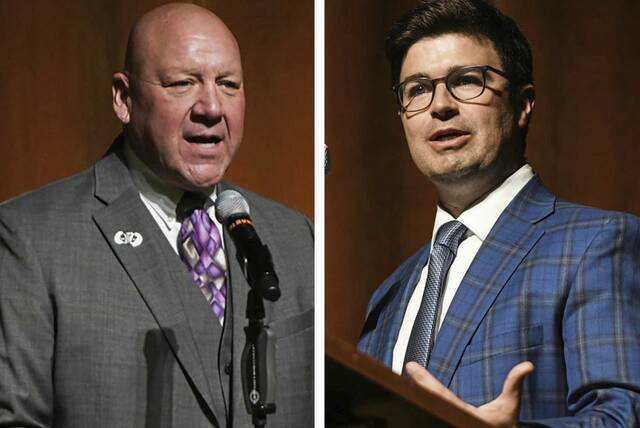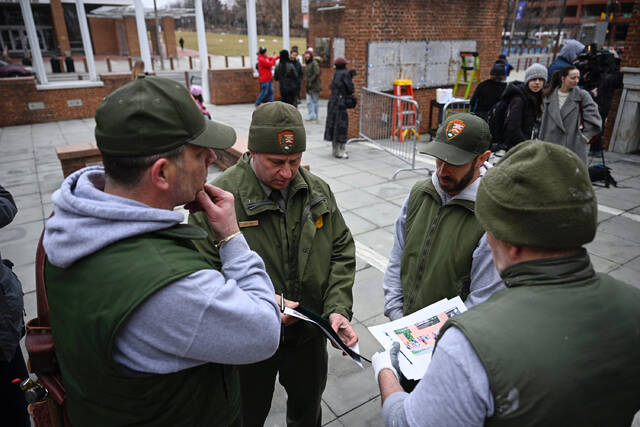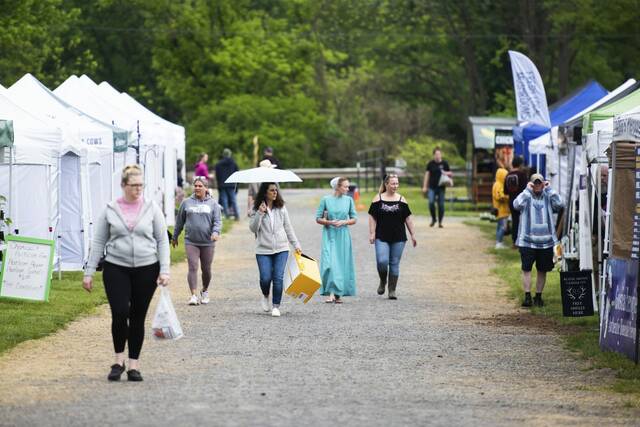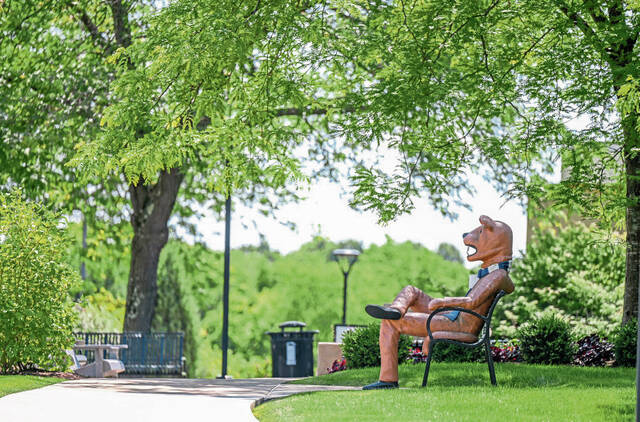Voters on Tuesday will choose either Democrat Corey O’Connor, the Allegheny County controller, or Republican Tony Moreno, a former Pittsburgh police officer, as Pittsburgh’s next mayor.
O’Connor, 41, of Point Breeze, is a former city councilman and son of the late Mayor Bob O’Connor. He defeated incumbent Mayor Ed Gainey for the Democratic nomination in the May primary.
Moreno, 57, of Brighton Heights, spent 24 years on the Pittsburgh police force. He came in third in the 2021 Democratic mayoral primary — behind Gainey and then-Mayor Bill Peduto — before running as a Republican in the general election, again losing to Gainey. He defeated businessman Thomas West in this year’s primary.
Here’s where the candidates stand on major issues:
Immigration enforcement
As President Donald Trump ramps up Immigration and Customs Enforcement actions around the country, O’Connor has followed Gainey’s approach and vowed not to cooperate with ICE.
“Our job is to protect everybody’s rights and freedoms in the city, and I will continue to do that,” O’Connor told TribLive. “When it comes to ICE, we will not partner. We’re a welcoming city. We want people to live here and feel safe and secure.”
O’Connor said he feared people would be wary of calling 911 if the city’s police force partnered with ICE, potentially putting lives at risk during emergencies.
Moreno, on the other hand, has criticized the city’s Democratic leaders for welcoming immigrants.
“We need to take care of the people who are here first,” Moreno recently said during a televised debate.
He has said Pittsburgh police “have to respond” when federal enforcement agencies are in the city.
A police policy, which went into effect in 2011, says “all sworn officers shall assist any federal, state, or local agency in enforcing or carrying out their duties and responsibilities.”
Moreno said that’s the case with judge-ordered warrants or administrative order, such as those that lead to Pittsburgh police assisting Allegheny County sheriff’s deputies with an eviction.
National Guard
O’Connor and Moreno both oppose the National Guard coming into Pittsburgh. Trump has threatened to deploy the guard to Democrat-run cities across the country and has done so in Chicago, Los Angeles and Washington, D.C., sparking outrage and litigation.
“We can handle ourselves,” O’Connor said.
Rather than welcoming federal interventions to tamp down crime, O’Connor said he would prioritize building police-community relationships and hiring a police chief.
Moreno, too, said he believed the city could address crime on its own.
“We don’t need them,” he said.
Public safety
O’Connor and Moreno both have repeatedly lambasted Gainey for rapid leadership changes in the police bureau under his tenure, arguing that having five chiefs in three years has sunk morale among the rank and file.
Both candidates have said their pick for chief would be someone who works or has worked the city police force.
Neither candidate wants to spend money on a national search, as Gainey had done when choosing Larry Scirotto as police chief. He ultimately left the city amid controversy less than a year later.
The two also agree the city needs to do more to recruit and retain officers, as the police bureau has seen its roster shrink to the lowest staffing levels in two decades.
O’Connor said he believes a controversial investment in a proposed public safety training facility in the city’s Lincoln-Lemington neighborhood could signal to officers that the city is committed to their development, a strategy he hopes will keep officers from leaving the force.
Moreno has said he wants to recruit more from local colleges and focus on attracting officers with military experience. Standardizing promotion policies, he said, could improve morale and retention.
Moreno has accused his opponent of defunding the police, referring to O’Connor’s support of the Stop the Violence Fund. While city officials allocate money equivalent to a portion of the police budget to violence prevention efforts each year, annual spending is not siphoned from the police bureau’s budget.
In 2020, however, O’Connor did vote to transfer $250,000 from the “police salaries” section of the 2020 operating budget to seed the Stop the Violence Fund.
“Corey O’Connor’s been trying to deflect any responsibility for this since he did it,” Moreno told TribLive. “It says it right there: ‘take from this revenue stream and put it in the Stop the Violence Fund.’ ”
O’Connor said he has never defunded the police and does not understand Moreno’s accusations.
Housing
Neither candidate wants to continue pushing for the affordable housing reform Gainey has championed, which would force developers to earmark a portion of housing units in any new projects as affordable housing for low-income residents.
Because of opposition from a majority of City Council members, such a policy seems unlikely to earn approval. Council recently rewrote the inclusionary zoning bill to make it voluntary.
O’Connor has pitched ideas like expediting permits and offering tax breaks to incentivize affordable housing development.
Moreno has said he wants to scrap the existing models for creating affordable housing altogether.
Currently, officials use area median income thresholds to determine what qualifies as affordable housing. Moreno wants to move away from that metric, which calculates affordability based on a wide area, including wealthy suburbs. He suggested taking a neighborhood-by-neighborhood approach instead.
Homelessness
O’Connor and Moreno both support the Office of Community Health and Safety, which, among other things, helps the city’s homeless population. Both want to boost its efforts, with O’Connor saying he would open operations centers throughout the city.
In his role as county controller, O’Connor discovered empty shelter beds sometimes sit unused, even as people are living on the streets. He wants to make the shelter pipeline more efficient to avoid such scenarios.
If elected, O’Connor said, he would make it easier to build single-occupancy transitional housing.
Moreno has outlined a tougher stance on homelessness, one in which officials would tell people they could not continue to live on streets and along riverside trails.
He wants more police intervention in homeless camps and stricter enforcement of drug laws he believes are flouted in encampments. Moreno also suggested more help for people experiencing mental health crises while living on the streets.
City finances
Both candidates have criticized Gainey’s handling of city finances. They have accused him of reckless spending and irresponsible budgeting.
O’Connor has vowed to trim the size of the mayor’s office — something Gainey has proposed doing for his successor in his 2026 budget proposal, despite ballooning staffing and spending there during his tenure — and generally look for cost-cutting measures in City Hall.
His long-term vision for solving the city’s financial challenges relies on economic growth. He wants to attract more businesses and residents to the city and offer support or incentives for entrepreneurs and start-ups to expand their businesses in the city.
Moreno has said he believes the city spends wastefully. He has promised to curb unnecessary spending, though he has not provided many details on how he would do so.
He said he believes public safety and core city services should be top priorities in the city budget.
Nonprofits
Neither candidate has backed Gainey’s ongoing efforts to take nonprofits to court, challenging the tax-exempt status of their properties.
They’re both eyeing voluntary payments from the city’s hospital systems and universities instead.
O’Connor’s tactic is to ask nonprofits for specific contributions that align with their missions. He said he plans to ask hospitals to buy the city much-needed ambulances.
He also said he’d ask smaller nonprofits to chip in.
Moreno similarly doesn’t believe nonprofits want to donate to the city’s general fund and leave it up to city officials to decide where their cash should go. He has echoed O’Connor’s suggestion of asking nonprofits to pay for specific expenses.
To encourage nonprofits to pay their fair share, Moreno said, he would craft a matrix that asks nonprofits to pay specific amounts based on their size.
Infrastructure
O’Connor, who sponsored legislation creating a commission that oversees infrastructure after the Fern Hollow Bridge collapse in 2022, wants to lobby more aggressively for more state and federal funds to fix bridges.
Rather than seeking bridge repair contracts one at a time, he told TribLive he wants to explore ways to potentially cut costs by bidding out multiple bridge projects at once.
He has promised to continue traffic calming measures as part of the city’s ongoing efforts to reduce to zero the number of fatal vehicle crashes each year.
Moreno said he wants to prioritize bridge and road maintenance in the city budget.
He argues the city’s Democratic leaders have ignored Pittsburgh’s infrastructure problems for far too long, citing the bridge collapse as the prime example.
Downtown revitalization
O’Connor wants to broaden the approach the city is taking to revitalizing a Downtown plagued by empty offices and declining property values since the covid-19 pandemic spurred a widespread shift to remote work.
Under Gainey, converting unused offices to mixed-income housing has been the focal point.
But O’Connor said housing needs to be one piece of the puzzle. He envisions a Downtown with a range of new businesses, from local entrepreneurs to clean energy companies to robotics institutes. He advocates also for more entertainment options in the Golden Triangle.
O’Connor’s vision also includes better-maintained public spaces and cheaper parking to encourage more people to visit the area.
Moreno believes Downtown needs a larger police presence. He wants to see homeless camps torn down and cleanliness improved.
He doesn’t like Gainey’s focus on making Downtown into a largely residential neighborhood, arguing the city needs to turn away from adding housing and focus instead on returning Downtown to the business hub it was before the pandemic.
“The bigger development opportunities — building high-rises — should be left to developers,” said Moreno, who has jabbed at inefficiencies in how the city issues building permits. “That should all be left to competition, to the free market.”
“It’s not a neighborhood,” Moreno said. “It’s called the business district.”








